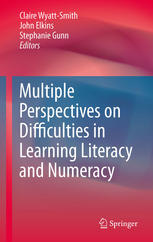

Most ebook files are in PDF format, so you can easily read them using various software such as Foxit Reader or directly on the Google Chrome browser.
Some ebook files are released by publishers in other formats such as .awz, .mobi, .epub, .fb2, etc. You may need to install specific software to read these formats on mobile/PC, such as Calibre.
Please read the tutorial at this link: https://ebookbell.com/faq
We offer FREE conversion to the popular formats you request; however, this may take some time. Therefore, right after payment, please email us, and we will try to provide the service as quickly as possible.
For some exceptional file formats or broken links (if any), please refrain from opening any disputes. Instead, email us first, and we will try to assist within a maximum of 6 hours.
EbookBell Team

4.3
8 reviewsThis book advances understandings of the difficulties in learning that students experience in the key areas of literacy and numeracy and the interventions that have been used to improve outcomes. By including authors drawn from several countries and with expertise in a variety of research traditions, the book addresses the sometimes complementary and sometimes contradictory results, and generates new approaches to understanding and serving students with difficulties in literacy and numeracy. A distinctive feature of the book is its focus at the intersection of literacy education, numeracy education and learning difficulties. Traditionally these have tended to be addressed separately by researchers and policy makers, leading to compartmentalised thinking and often demonstrates lack of awareness of developments in the other domains. In short, to date there has been limited exchange across these fields. Further, the published research and indeed policy attention indicates a relative imbalance given to literacy and numeracy education and learning difficulties relative to these more generally. The authors in this book respond to this by providing a more balanced coverage of these fields and extend the discussion into the contribution of information and communication technologies. This book brings together for the first time internationally recognised scholars from a diverse range of countries whose contributions provide an opening for new insights into difficulties in learning literacy and numeracy from a range of educational policy and practice contexts.